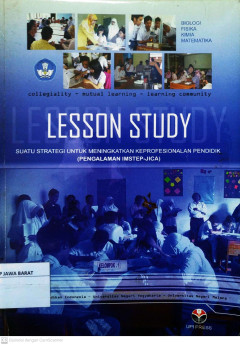Ditapis dengan
Ditemukan 5266 dari pencarian Anda melalui kata kunci:

Wak Dulhong
- Edisi
- -
- ISBN/ISSN
- -
- Deskripsi Fisik
- -
- Judul Seri
- -
- No. Panggil
- 899.2 KOE w
- Edisi
- -
- ISBN/ISSN
- -
- Deskripsi Fisik
- -
- Judul Seri
- -
- No. Panggil
- 899.2 KOE w

Nyala JIwa Pejuang
- Edisi
- -
- ISBN/ISSN
- 978-623-95037-9-6
- Deskripsi Fisik
- -
- Judul Seri
- 813 TAK n
- No. Panggil
- -
- Edisi
- -
- ISBN/ISSN
- 978-623-95037-9-6
- Deskripsi Fisik
- -
- Judul Seri
- 813 TAK n
- No. Panggil
- -

Buku percakapan bahasa indonesia bagi penutur asing (BIPA)
- Edisi
- -
- ISBN/ISSN
- 978-602-168616-4
- Deskripsi Fisik
- -
- Judul Seri
- -
- No. Panggil
- 438 MUL b
- Edisi
- -
- ISBN/ISSN
- 978-602-168616-4
- Deskripsi Fisik
- -
- Judul Seri
- -
- No. Panggil
- 438 MUL b

Lesson Study : Suatu Strategi untuk Meningkatkan Keprofesionalan Pendidik
- Edisi
- -
- ISBN/ISSN
- iv+162 hlm.;17,5x24 cm
- Deskripsi Fisik
- -
- Judul Seri
- -
- No. Panggil
- 371 HEN l
- Edisi
- -
- ISBN/ISSN
- iv+162 hlm.;17,5x24 cm
- Deskripsi Fisik
- -
- Judul Seri
- -
- No. Panggil
- 371 HEN l
 Karya Umum
Karya Umum  Filsafat
Filsafat  Agama
Agama  Ilmu-ilmu Sosial
Ilmu-ilmu Sosial  Bahasa
Bahasa  Ilmu-ilmu Murni
Ilmu-ilmu Murni  Ilmu-ilmu Terapan
Ilmu-ilmu Terapan  Kesenian, Hiburan, dan Olahraga
Kesenian, Hiburan, dan Olahraga  Kesusastraan
Kesusastraan  Geografi dan Sejarah
Geografi dan Sejarah